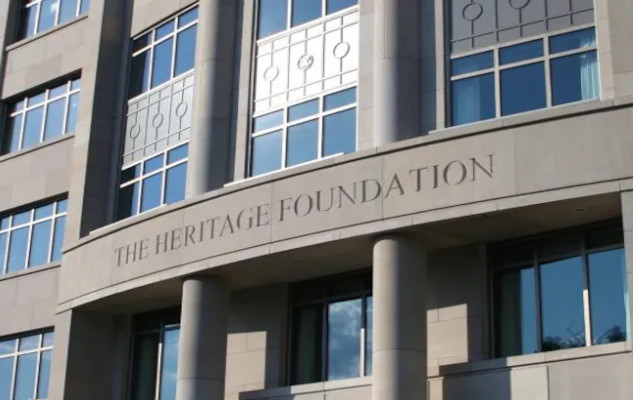
In this Article:
- How has the Heritage Foundation shaped Republican policy over the years?
- What is Project 2025, and how could it reshape American governance?
- How have wealthy donors influenced the Heritage Foundation’s agenda?
- What role does supply-side economics play in the erosion of democracy?
- Is the Heritage Foundation working toward an oligarchy in the U.S.?
The Hidden Influence of the Heritage Foundation On America
by Robert Jennings, InnerSelf.com
The Heritage Foundation, a conservative think tank founded in 1973, has played a pivotal role in American politics and governance. For the past five decades, it has been instrumental in shaping the Republican Party's policy and ideological direction, standing as a key player in an era of political upheaval and liberal ascendancy. The Foundation's development of policy blueprints has guided every Republican administration since Ronald Reagan, promoting free-market economics, deregulation, and conservative social values.
But the Heritage Foundation's impact goes far beyond policy papers. Its long-standing influence, backed by wealthy donors and corporate interests, has contributed to the erosion of democratic principles, concentrating wealth and power in the hands of a few. The organization's latest blueprint, Project 2025, represents the culmination of decades of work to replace democracy with a government run by an oligarchic elite.
The Founding of the Heritage Foundation
In the early 1970s, America was a nation in transition. The social upheavals of the 1960s, combined with growing dissatisfaction with liberal policies under the Great Society programs, had left conservatives feeling marginalized. Paul Weyrich, Edwin Feulner, and Joseph Coors founded the Heritage Foundation in this climate. They aimed to create a conservative think tank to analyze public policy and actively shape it.
Unlike more academic think tanks of the time, such as the Brookings Institution, the Heritage Foundation sought to influence government policy directly by providing Republican lawmakers with actionable, concise, and politically expedient recommendations. The foundation was born out of frustration with the slow-moving, complex policy research process. Weyrich and Feulner understood that if radical conservative ideas were to take hold in the halls of power, they needed to be presented in a way that was easy to implement and aligned with corporate and wealthy donor interests.
Joseph Coors, the beer magnate, provided much of the initial funding for Heritage, seeing it as a vehicle to promote radical conservative values and counter the perceived liberal bias of mainstream media and academia. Early support also came from the Scaife Foundation, controlled by conservative billionaire Richard Mellon Scaife, and other right-wing donors eager to see the government roll back regulations, lower taxes, and limit social welfare programs.
The Heritage Foundation's Strategy for Policy Influence
The Heritage Foundation's influence can be attributed to its strategic approach to public policy. From its inception, Heritage has sought to shape conservative policy by producing Mandate for Leadership, a series of policy blueprints for Republican administrations. Unlike traditional think tanks' dense reports, these blueprints were pragmatic, easy to digest, and designed for immediate implementation. They allowed Republican lawmakers to adopt policies quickly and efficiently without creating or debating new ideas with others.
The first Mandate for Leadership, produced for the incoming Reagan administration in 1980, set the tone for decades of conservative governance. It contained over 2,000 specific policy recommendations, ranging from tax cuts and deregulation to national defense and foreign policy. Ronald Reagan's team adopted many of these ideas wholesale, leading to a significant shift in American governance toward free-market, deregulated capitalism, reduced government size, and an emphasis on military power. This blueprint helped shape the Reagan Revolution and laid the groundwork for the economic and social policies that dominated radical conservative thinking for the next several decades.
Heritage's success lies in turning conservative ideals into legislative reality. By focusing on crafting practical, actionable recommendations, they have been able to embed their ideology into the core of Republican policy-making. Over the years, Heritage has produced these policy blueprints, ensuring that each Republican administration, from George H.W. Bush to Donald Trump, followed a consistent conservative agenda.
The Driving Force Behind Heritage
The Heritage Foundation's agenda has always been heavily influenced by its donors. From its earliest days, wealthy individuals and corporate interests have provided the financial backing that allows Heritage to operate as a political force. Key donors, including Charles and David Koch, Richard Mellon Scaife, and the Bradley Foundation, have poured millions into the organization, ensuring that Heritage's policy recommendations align with their economic interests.
At its core, Heritage's policies are designed to benefit the wealthy and corporate America. By promoting deregulation, lower corporate taxes, and a smaller federal government, the foundation serves the interests of those who stand to gain the most from an unfettered free market. For example, Heritage has long advocated for the rollback of environmental regulations, a position that directly benefits industries such as oil and gas, which are significant donors to the organization. Likewise, its push for privatizing public services, such as education and healthcare, serves the interests of corporations looking to profit from these sectors.
The influence of these donors is evident in the policies that Heritage promotes. The foundation's agenda is not just about conservative values but also about protecting and expanding the wealth of the elite. By pushing for policies that reduce government oversight and taxation, Heritage ensures that the wealthy can continue accumulating power and influence. At the same time, the middle and working classes bear the brunt of economic inequality.
Erosion of Democracy Through Heritage's Blueprints
Over the years, Heritage has produced a series of policy blueprints that have systematically eroded American democracy, concentrating power in the hands of the few while dismantling public institutions that serve the many. Below is a list of the Mandate for Leadership blueprints and their impact on American governance:
- Mandate for Leadership (1981): Prepared for the Reagan administration, this blueprint called for deep tax cuts, deregulation, and military expansion. It laid the foundation for the rise of supply-side economics, which has disproportionately benefited the wealthy while leaving the middle and lower classes behind.
- Mandate for Leadership II (1985): Building on the success of the first Mandate, this blueprint continued to push for reduced government spending and deregulation, particularly in areas like environmental protection and labor rights. Reagan's second term saw further entrenchment of these policies, which widened the wealth gap and weakened regulatory safeguards.
- Mandate for Leadership III (1989): Aimed at the George H.W. Bush administration, this blueprint advocated for tax cuts and deregulation, focusing on foreign policy and defense spending. The expansion of the military-industrial complex during this time further solidified the power of corporate interests over democratic governance.
- Mandate for Leadership IV (1997): Published during Bill Clinton's second term, this blueprint sought to influence the newly Republican-led Congress. It called for welfare reform, cuts to public spending, and further deregulation of industries, leading to the dismantling of social safety nets and the rise of corporate dominance in critical sectors.
- Mandate for Leadership 2000 (2000): Developed for George W. Bush's presidency, this blueprint emphasized tax cuts for the wealthy, privatization of public services, and an aggressive foreign policy after 9/11. These policies exacerbated income inequality and weakened the middle class, particularly the tax cuts.
- Mandate for Leadership 2017 (2017): Under the Trump administration, Heritage's influence was evident in policies such as the Tax Cuts and Jobs Act, which primarily benefited corporations and the wealthy, and the rollback of environmental protections. Trump's judicial appointments, many of whom were vetted by Heritage, shifted the judiciary to the right, further entrenching conservative control over vital democratic institutions.
- Project 2025 (2025): Heritage's latest blueprint is perhaps its most ambitious yet. It calls for consolidating executive power, dismantling regulatory agencies, and rolling back civil rights protections. If implemented, Project 2025 would fundamentally reshape American governance, reducing democratic oversight and concentrating power in the hands of a few elites.
Supply-side Economics and Its Long-term Consequences
At the heart of the Heritage Foundation's economic philosophy is supply-side economics—the belief that cutting taxes for the wealthy and corporations will spur economic growth that benefits everyone. This idea, first promoted during the Reagan administration, has become a cornerstone of conservative financial policy. However, decades of data show that supply-side economics has failed to deliver on its promises.
Supply-side economics has led to a dramatic increase in income inequality instead of generating widespread prosperity. Tax cuts for the wealthy have not "trickled down" to the middle and working classes. Instead, they have concentrated wealth at the top, leaving most Americans with stagnant wages and declining economic security.
The long-term consequences of these policies are evident in the erosion of the middle class and the growing divide between the rich and the poor. Today, a small elite controls an overwhelming share of the nation's wealth. At the same time, millions of Americans struggle to make ends meet. This economic inequality has weakened the country's social fabric, fueling political polarization, social unrest, and a growing distrust in democratic institutions.
Supply-side economics has also had global repercussions. Countries that followed the U.S. lead in adopting these policies have experienced similar outcomes, with rising inequality, weakened public services, and growing disillusionment with democracy. The failure of supply-side economics has destabilized the U.S. and democracies worldwide.
The Role of Media and Public Opinion Manipulation
The Heritage Foundation has influenced policy and shaped public opinion by controlling conservative media outlets and strategically manipulating information. Heritage has amplified its message by partnering with media giants like Fox News and conservative talk radio, shaping the national discourse on immigration, healthcare, and climate change.
In addition to its partnerships with right-wing media, Heritage runs The Daily Signal, an online conservative news platform designed to provide its readers with a steady stream of conservative talking points. Heritage can directly influence public perception of key issues through The Daily Signal, creating a narrative that aligns with its policy goals.
This control over the flow of information has allowed Heritage to manipulate public opinion in favor of its corporate backers and conservative ideology. By promoting misinformation on topics like climate change and healthcare, Heritage has successfully framed these issues in ways that benefit the wealthy and powerful while undermining the public's ability to make informed decisions.
The Attack on Civil Rights and Individual Freedoms
The Heritage Foundation's policy recommendations have systematically targeted civil rights and individual freedoms, particularly in areas like reproductive rights, LGBTQ+ protections, and voting rights. Heritage-backed policies have sought to restrict access to abortion, dismantle protections for LGBTQ+ individuals, and implement voting restrictions that disproportionately affect minority communities.
These efforts are part of a broader strategy to consolidate power in the hands of a socially conservative elite while marginalizing those who do not fit within their narrow definition of "traditional values." By rolling back civil rights protections, Heritage is not only limiting the freedoms of marginalized communities but also undermining the democratic principles of equality and justice.
The Danger of Oligarchy: Heritage's Ultimate Goal
At its core, the Heritage Foundation's agenda is about consolidating power in the hands of a few, creating an oligarchic system instead of a democracy where wealth and influence dictate policy. Through its policy blueprints, Heritage has worked to reduce democratic oversight, limit the power of public institutions, and shift government control to corporate interests and the wealthy elite.
Project 2025 represents the culmination of this strategy. If fully implemented, it would dismantle vital democratic institutions, concentrate executive power, and reduce public accountability. The result would be an America where the wealthy few control the levers of power, while most citizens have little influence over their government.
The Heritage Foundation has spent the past five decades working to reshape American governance to benefit the wealthy and powerful at the expense of the public good. Through its policy blueprints, particularly the Mandate for Leadership series and Project 2025, Heritage has systematically eroded the foundations of American democracy, promoting policies that concentrate wealth and power in the hands of a few.
As Heritage's influence grows, the threat to American democracy becomes more pronounced. Suppose we are to preserve the democratic ideals of equality, justice, and liberty. In that case, we must recognize the dangers posed by the Heritage Foundation's agenda and work to restore public accountability, protect civil rights, and promote policies that benefit all Americans—not just the wealthy elite.
The future of American democracy depends on it.
Article Recap:
The Heritage Foundation’s influence on American democracy has eroded democratic principles. Project 2025 and previous blueprints served as tools to concentrate power among the wealthy elite. By promoting policies like supply-side economics and deregulation, Heritage has systematically reshaped U.S. governance to favor corporations and wealthy individuals, threatening the democratic process.
About the Author
 Robert Jennings is co-publisher of InnerSelf.com with his wife Marie T Russell. He attended the University of Florida, Southern Technical Institute, and the University of Central Florida with studies in real estate, urban development, finance, architectural engineering, and elementary education. He was a member of the US Marine Corps and The US Army having commanded a field artillery battery in Germany. He worked in real estate finance, construction and development for 25 years before starting InnerSelf.com in 1996.
Robert Jennings is co-publisher of InnerSelf.com with his wife Marie T Russell. He attended the University of Florida, Southern Technical Institute, and the University of Central Florida with studies in real estate, urban development, finance, architectural engineering, and elementary education. He was a member of the US Marine Corps and The US Army having commanded a field artillery battery in Germany. He worked in real estate finance, construction and development for 25 years before starting InnerSelf.com in 1996.
InnerSelf is dedicated to sharing information that allows people to make educated and insightful choices in their personal life, for the good of the commons, and for the well-being of the planet. InnerSelf Magazine is in its 30+year of publication in either print (1984-1995) or online as InnerSelf.com. Please support our work.
Creative Commons 4.0
This article is licensed under a Creative Commons Attribution-Share Alike 4.0 License. Attribute the author Robert Jennings, InnerSelf.com. Link back to the article This article originally appeared on InnerSelf.com

Related Books:
On Tyranny: Twenty Lessons from the Twentieth Century
by Timothy Snyder
This book offers lessons from history for preserving and defending democracy, including the importance of institutions, the role of individual citizens, and the dangers of authoritarianism.
Click for more info or to order
Our Time Is Now: Power, Purpose, and the Fight for a Fair America
by Stacey Abrams
The author, a politician and activist, shares her vision for a more inclusive and just democracy and offers practical strategies for political engagement and voter mobilization.
Click for more info or to order
How Democracies Die
by Steven Levitsky and Daniel Ziblatt
This book examines the warning signs and causes of democratic breakdown, drawing on case studies from around the world to offer insights into how to safeguard democracy.
Click for more info or to order
The People, No: A Brief History of Anti-Populism
by Thomas Frank
The author offers a history of populist movements in the United States and critiques the "anti-populist" ideology that he argues has stifled democratic reform and progress.
Click for more info or to order
Democracy in One Book or Less: How It Works, Why It Doesn't, and Why Fixing It Is Easier Than You Think
by David Litt
This book offers an overview of democracy, including its strengths and weaknesses, and proposes reforms to make the system more responsive and accountable.



























